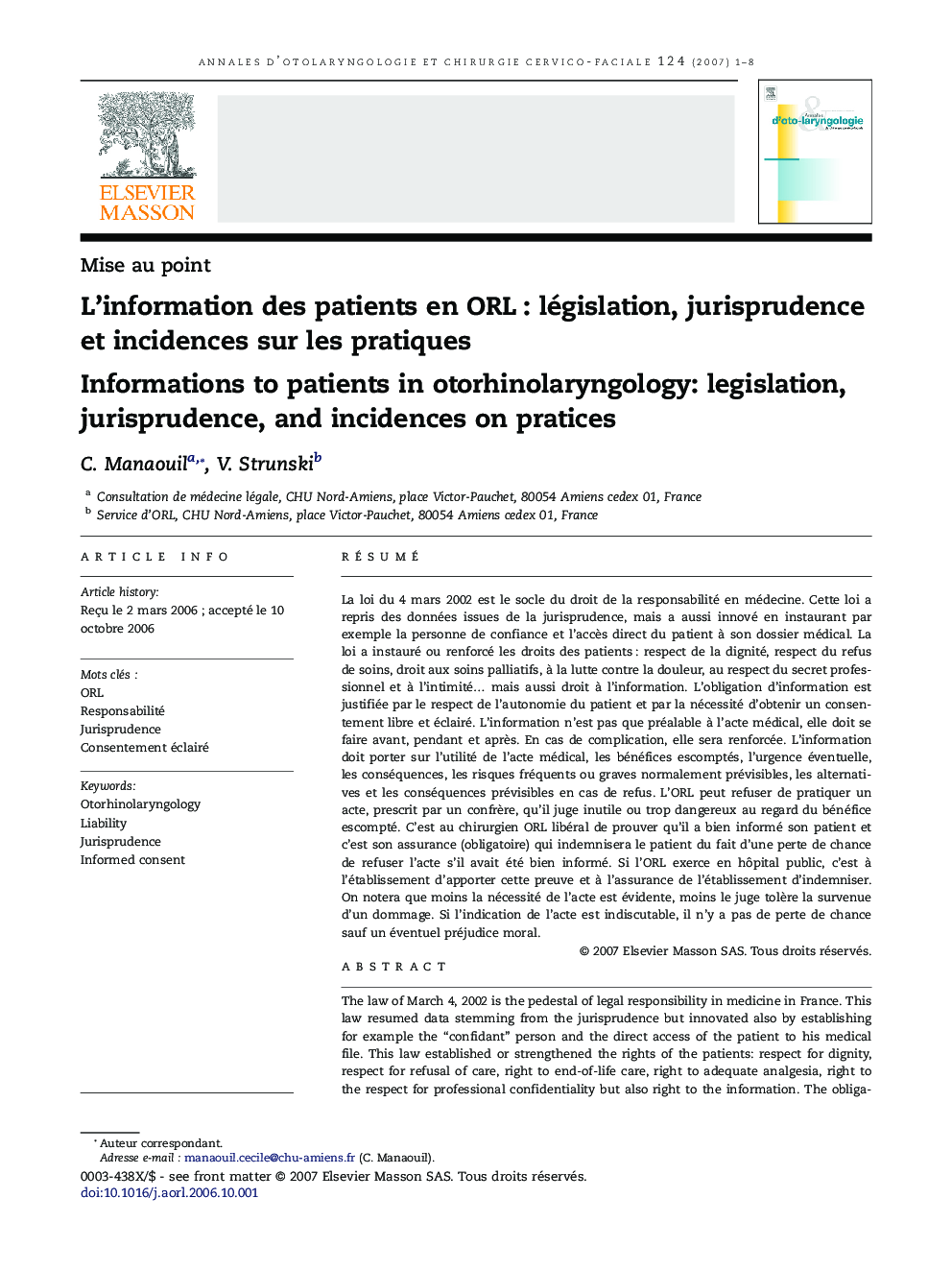| کد مقاله | کد نشریه | سال انتشار | مقاله انگلیسی | نسخه تمام متن |
|---|---|---|---|---|
| 4105982 | 1269188 | 2007 | 8 صفحه PDF | دانلود رایگان |

RésuméLa loi du 4 mars 2002 est le socle du droit de la responsabilité en médecine. Cette loi a repris des données issues de la jurisprudence, mais a aussi innové en instaurant par exemple la personne de confiance et l'accès direct du patient à son dossier médical. La loi a instauré ou renforcé les droits des patients : respect de la dignité, respect du refus de soins, droit aux soins palliatifs, à la lutte contre la douleur, au respect du secret professionnel et à l'intimité… mais aussi droit à l'information. L'obligation d'information est justifiée par le respect de l'autonomie du patient et par la nécessité d'obtenir un consentement libre et éclairé. L'information n'est pas que préalable à l'acte médical, elle doit se faire avant, pendant et après. En cas de complication, elle sera renforcée. L'information doit porter sur l'utilité de l'acte médical, les bénéfices escomptés, l'urgence éventuelle, les conséquences, les risques fréquents ou graves normalement prévisibles, les alternatives et les conséquences prévisibles en cas de refus. L'ORL peut refuser de pratiquer un acte, prescrit par un confrère, qu'il juge inutile ou trop dangereux au regard du bénéfice escompté. C'est au chirurgien ORL libéral de prouver qu'il a bien informé son patient et c'est son assurance (obligatoire) qui indemnisera le patient du fait d'une perte de chance de refuser l'acte s'il avait été bien informé. Si l'ORL exerce en hôpital public, c'est à l'établissement d'apporter cette preuve et à l'assurance de l'établissement d'indemniser. On notera que moins la nécessité de l'acte est évidente, moins le juge tolère la survenue d'un dommage. Si l'indication de l'acte est indiscutable, il n'y a pas de perte de chance sauf un éventuel préjudice moral.
The law of March 4, 2002 is the pedestal of legal responsibility in medicine in France. This law resumed data stemming from the jurisprudence but innovated also by establishing for example the “confidant” person and the direct access of the patient to his medical file. This law established or strengthened the rights of the patients: respect for dignity, respect for refusal of care, right to end-of-life care, right to adequate analgesia, right to the respect for professional confidentiality but also right to the information. The obligation of information is justified by the respect for the autonomy of the patient and by the necessity of obtaining a free and lit assent. Information is not only a preliminary to the medical act; it has to be done before, during and after. In case of complication, it will be reinforced. The information has to deal with the necessity of the medical act, the expected benefits, the possible urgency, the consequences, the normally predictable frequent or severe complications, the alternatives and the predictable consequences in case of refusal. The oto-laryngologist can refuse to perform an act prescribed by a colleague that he considers useless or too dangerous as compared to the benefit expected. The surgical oto-laryngologist in private practice has to prove that he informed his patient and it is his (compulsory) malpractice insurance that financially compensates the patient in case insufficient information leads the patient to lose his or her chance to refuse treatment. If the surgical oto-laryngologist practices in a public hospital, the establishment has to bring this proof of sufficient information, and in case of litigation, the hospital must provide compensation. One will note that the more difficult it is to justify the medical act, the less the judges tend to tolerate insufficient patient information. If the indication of the act is indisputable from a medical standpoint, then legally there is usually no ground for litigation due to insufficient information except possibly emotional damage.
Journal: Annales d'Otolaryngologie et de Chirurgie Cervico-faciale - Volume 124, Issue 1, March 2007, Pages 1–8